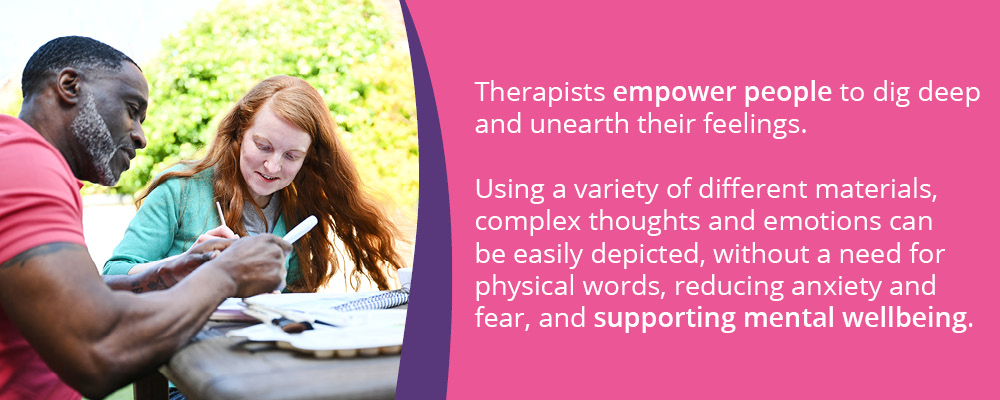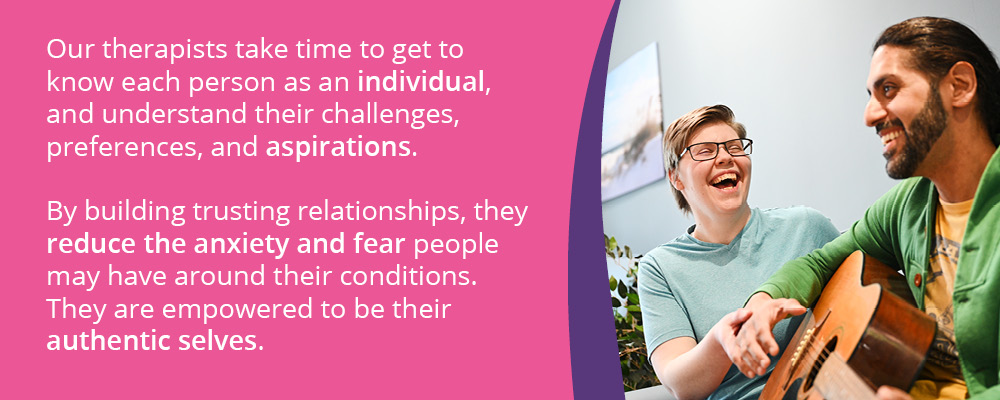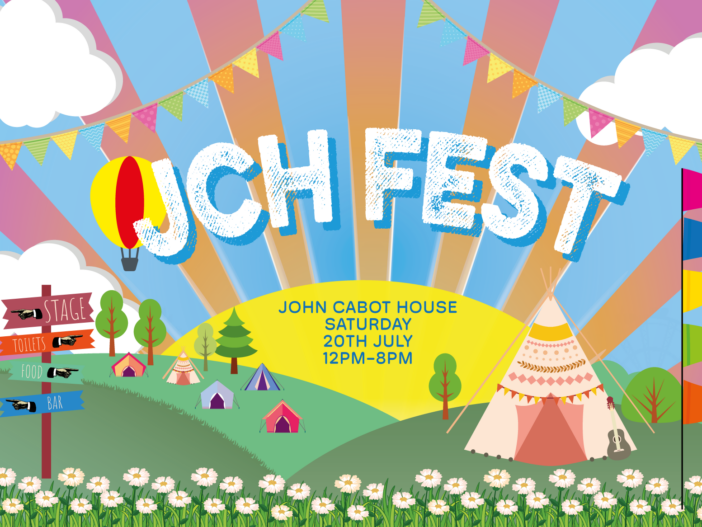Painting bright futures with creative therapies in brain injury rehabilitation
Brain injuries have a significant impact on someone’s life. From struggling to accept their condition, to physical and emotional challenges, there are many pieces to the puzzle – and most of these are invisible. Addressing both visible and non-visible needs is key to understanding the support someone needs on their rehabilitation journey to regain their quality of life.
Alongside our person-centred approach, we adopt the slow stream rehabilitation technique, looking at the bigger picture of someone’s life, beyond their physical support needs. This includes using a wide range of clinically proven neurological therapies to support the challenges people with brain injuries face.
From Physiotherapy to Psychotherapy, we consider how someone’s past and present circumstances might affect their goals and rehabilitation outcomes.
We also use creative therapies to support many aspects of the rehabilitation journey, as emotional wellbeing, cognitive development and communication can all benefit from applications like drama and music.
But they also have additional benefits that burrow deeply beneath the surface.
What are creative therapies?
Creative therapies play a big role in brain injury rehabilitation. As well as improving functional skills essential for daily living, creative therapies can help individuals rediscover themselves. Building a sense of self-identity, creative sessions support people with brain injuries to adapt to their past experiences of life. This supports them to find new ways of thinking about situations and changes their perceptions of themselves and other people.
Aiding cognitive function, this enables people to process information about the world around them more effectively and cope with new situations and challenges.
Art-based interventions also support self-expression and provide a non-verbal “voice” for people with brain injuries. New methods of expressing themselves can reduce the anxiety many people with brain injuries experience when communicating, empowering them to continue to explore exciting new ways of freely expressing their thoughts and feelings. This helps us craft a better understanding of individuals, their needs, wishes and preferences, which empowers our teams to truly tailor the support we provide.
Collaborating with industry-leading therapy providers, our sessions foster a safe, nurturing environment where the people we support are empowered to build self-awareness, relearn skills, and work towards reaching their goals.
It’s a space that’s free of judgement, where individuals can freely express themselves and learn to find peace with their pasts, so they can move forward with their futures.

A scientific foundation
Most creative therapies are underpinned by psychotherapy and are commonly used to treat mental health conditions outside the brain injury space. Our therapists are expertly trained to apply the principal techniques of creative therapies to the complex needs of people with brain injuries.
With a deep understanding of how the brain functions and how it might be affected after trauma, specialist techniques are used to target specific parts of the brain.
Therapists across the creative disciplines collaborate with each other, as well as with rehabilitation support teams, to ensure sessions are tailored to meet an individual’s needs – supporting them to fulfil their rehabilitation goals.
Sessions are pre-planned in line with someone’s goals but are kept fluid so they can adapt to how the individual feels on the day. With a thorough understanding of brain injuries and how they can affect someone’s emotions and behaviours, therapists have a portfolio of practices they can use to suit someone’s feelings, while helping them work towards their goals.
Our core creative therapies
Neuro Music Therapy
Differing from traditional music therapy, Neuro Music Therapy is a science-based model consisting of 20 core techniques. Focusing on using music and sound, this type of therapy benefits psychological, relational, and social outcomes. Effective in promoting insight, it also addresses emotional factors like grief, trauma, and stuck emotions, helping someone to acknowledge their condition and process the feelings surrounding it.
Working on parts of the brain that respond to music, Neuro Music Therapy can also support physical development and is clinically proven to be beneficial in supporting gait training for those relearning to walk.
With many sensorimotor benefits, this type of therapy can also support development in functional areas, including daily living skills like making a cup of tea, as it retrains the brain’s memory and influences sequencing skills. These are essential for functional activities, as well as social activities like crossing the road or paying for items in a shop.
Neuro Music Therapy is also an effective communication aid for those who have lost their verbal communication skills. Supporting speech and language development, music and sound are also beneficial for those struggling to express their thoughts and feelings. Delivered in safe environments, these sessions allow the people we support to delve deeply into their difficulties and unlock emotions that may be inhibiting their progression.
Additionally, Neuro Music Therapy encourages active participation in one-to-one sessions, and social interaction with others in group settings. Not only does this help the people we support reach their goals, but it promotes overall wellbeing and brings a sense of freedom and fun. Many people even reveal undiscovered talents, paving way for exciting new hobbies and passions!
Neuro Art Therapy
Using an application of artistic elements, Neuro Art Therapy is built on psychotherapy and is used to support behaviour and mood management. This type of therapy uses artistic concepts like symbolism, images, and sculptures to improve psychological wellbeing. It can also be beneficial in supporting physical outcomes, by encouraging use of the upper limbs, and hand-eye coordination.
With its direct link to psychotherapy, creating and discussing art pieces, like paintings and collages, can be particularly beneficial to those suffering from trauma or presenting Post Traumatic Stress Disorder (PTSD) symptoms. Experiencing unusual thoughts and perceptions might make someone with a brain injury feel anxious or ashamed, preventing them from talking about what might be concerning them. But engaging with art therapy provides a blank canvas for freedom of expression, empowering people with brain injuries to dig deep and release their feelings.
Using a variety of different materials, complex thoughts and emotions can be easily depicted, without a need for physical words, reducing anxiety and fear, and supporting mental wellbeing.
In a safe space, they can shine a light on emotional blocks and support people in clearing the path, so they can move forward on their rehabilitation journey.
Neuro Drama Therapy
Much like the use of painting and visual art, the foundations of Neuro Drama Therapy lie in psychotherapy. Differing from acting and performing, this type of therapy applies dramatic elements, like storytelling and character development, to support psychological development.
Sessions are coordinated around the individual’s past experiences and current ambitions. The body and other creative mediums, like puppets and masks, are used to convey emotions and express thoughts and concerns. Props are also used as part of this and can support people with brain injuries to feel less vulnerable and share their stories, helping them process and accept their condition, releasing trauma, and stored up emotions.
Neuro Drama Therapy serves many purposes to people with brain injuries. Alongside psychological rewards, it also supports the brain’s executive functions, like problem-solving, and can have physical benefits too. Neuro Drama Therapists have a deep understanding of how both brain injuries and mental health conditions can affect someone’s movement. By using the body for performance, we can promote gentle activity to support coordination and motor skills.
Engaging in the dramatic arts can also provide a sense of escapism for people with brain injuries, instilling a sense of relief, enjoyment, and hope. Although it isn’t exclusively performance-based, Neuro Drama Therapy might include this to promote participation and social engagement in group sessions.
How does it work?
Person-centred support is at the heart of all that we do. Our professional therapy partners, Chroma, echo our ethos, putting the people we support at the centre of their sessions, ensuring they get exactly what they need every time. Whether that’s communicating something they’re afraid to talk about through painting, or simply singing loudly to shake off some stress, the people we support are empowered to make decisions and take control of their wellbeing.
Collaborating with our Therapy Leads, the people we support and their support networks, our creative Therapists at Chroma outline a plan to help individuals achieve their rehabilitation goals. From learning to walk again, to transitioning back into the community, our creative therapists empower the people we support to fulfil their aspirations.
Creative Therapists use a balance of creativity and clinical practices to explore different ways of supporting individuals with brain injuries to reach their goals. Support is based on the barriers someone might be facing when working towards their goals. For example, someone might wish to move to a transitional flat but suffers from a sense of abandonment. In this case, Art Therapy might be used to help someone unlock emotions about past experiences and change their perceptions around living independently.
The people we support are empowered to choose their creative activities with the help of their therapist. Working collaboratively empowers them to make decisions, while staying on track to reach their goals.
Our therapists understand the importance of encouraging the people we support to make decisions about their care. They work in a way that helps people feel confident to express their opinions and ask questions about their therapies.

Dedicated support
Within our brain injury rehabilitation services, we support individuals to engage in therapy techniques outside their scheduled sessions. Our expert teams include a dedicated Therapy Lead. Playing an important role in bridging the gap between therapists and the people we support; they help connect individuals with the right therapists.
Even though they’re always on hand to support people during their sessions, they respect individuals’ privacy and might not attend discussions around sensitive subjects.
Creative therapies like Neuro Drama Therapy and Neuro Art Therapy are usually kept private. Instead, Therapy Leads will look for opportunities outside these sessions where they can get involved in supporting this type of therapy. Visiting art galleries, museums, shopping for art supplies, and choosing a landscape to paint are all ways they can support therapy delivery.
If a person we support is not engaging well with their therapy, their Therapy Lead works with them to overcome barriers and get them back on track. Playing an important role in providing emotional support, they have excellent insight into each person we support.
Faithfully by their sides, they respect individual choices and preferences, to support people to live their lives to the fullest. They empower individuals to enjoy their therapy sessions and make strides towards bringing their hopes and dreams to life.
Find out more
If you’d like to learn more about our specialist brain injury support and how we can help you or a loved one, fill out our quick and easy form and a member of the team will be in touch.

 Information
Information 

